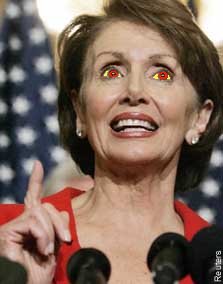
Madame Speaker is seeing red over internal party troubles
New York Post
Defeated Republicans are strangely jubilant, while victorious Democrats are shaking their heads in dismay. Why, oh why, did civil war have to erupt inside the Democratic Party only a week after its stunning triumph in the midterm elections?
Item: Washington's new No. 1 Dem, Speaker-to-be Nancy Pelosi, decided she wanted her sleazy born-again-peacenik buddy Jack Murtha to be the House majority leader. That's the No. 2 slot. Not so fast, said the House's current No. 2 Dem, Steny Hoyer: He forcefully pushed back against Pelosi's efforts to oust him and trounced Murtha in yesterday's vote of Democratic House members.
So Pelosi and Hoyer - who ran against each other for the post of minority leader in 2001 and are said to dislike and distrust each other - must now work together on the complex task of managing the rules and structure of the House of Representatives.
Item: James Carville is calling for the head of Howard Dean, the chairman of the Democratic Party. He likens Dean to Donald Rumsfeld - perhaps the nastiest thing Carville could imagine saying - and actually blames the Man from Yeeargh for spending money in a way that limited Democratic gains in the House to 29. They could have been 40 to 50, some Dems are saying. Dean must fry.
Yes, it seems like a disaster for the Democrats.
Only it isn't. This behavior is a sign of the Democratic Party's health, not its weakness.
Dems have power on Capitol Hill for the first time in a dozen years after winning around 53 percent of the vote for House seats last Tuesday.
And House Democrats have made several correct judgments about their victory. The first is that Nancy Pelosi was not its architect and requires little or no deference. If anything, they won in spite of her, not because of her.
For months, she went back and forth on the question of whether Democrats should offer their version of the 1994 "Contract with America" that united Republican themes in a single document. She said no, she said yes, she said no, and finally she issued such a document . . . which said almost nothing of interest.
On several occasions, Pelosi announced an overall slogan under which Democrats would run for office in 2006. Her first stab at it was "Together America Can Do Better," which was neither memorable nor literate. After several other futile efforts, she ended up with "A New Direction for America," which was certainly nothing special.
Unquestionably, Democrats benefited at the polls in 2006 from not having a unified message. This allowed some of them to run to the Right in the South, others to run to the Left in the Northwest and still others to run populist in the Midwest and maximize their electoral potential.
But that was not Pelosi's doing. Rather, that was the handiwork of Rahm Emanuel, the Chicago Democrat who recruited the right candidates, raised money for them and made sure they knew what themes were working, according to Democratic polls.
There are reasons to question Pelosi's political judgment, as Murtha's bungled majority leader bid demonstrates. The fact that Democrats did question it and went their own way suggests they're not going to march over a cliff behind Pelosi, whose views constitute almost a caricature of American left-liberalism at its most provincial.
And the fact that they supported a strong majority leader in Steny Hoyer means that they voted for a certain amount of creative tension at the top of the House - which is probably all to the good.
When GOP Speaker Newt Gingrich was running things in 1995 and 1996 without that creative tension, he got off to a decent start . . . before driving himself and his caucus straight into a brick wall where public opinion and policy were concerned.
As for Carville and Dean, that fight too is a mark of partisan health. Dean has been a bad chairman of the party, and he also deserves little or no credit for the midterm victories. He won the party chairmanship the old-fashioned way - by promising to throw money in every direction to every state party. That promise earned him support from Democrats in places like Mississippi and Utah hungry for D.C. cash, but spending in that way is little more than quixotic frivolity.
Democrats interested in building on their successes need to have these kinds of fights, quarrels and power struggles. When parties fail to have these clarifying battles, they end up making the kinds of disastrous errors that helped derail the Republican reform agenda and gave Democrats running room to trounce GOP Hill hacks as they did last week.

No comments:
Post a Comment